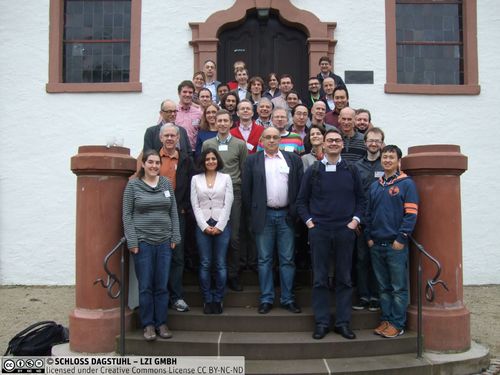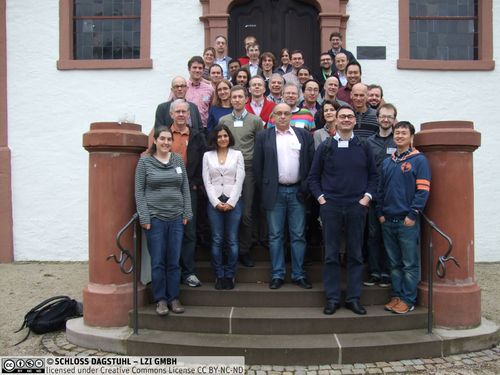Dagstuhl Seminar 14441
Modeling, Verification, and Control of Complex Systems for Energy Networks
( Oct 26 – Oct 31, 2014 )
Permalink
Organizers
- Alessandro Abate (University of Oxford, GB)
- Martin Fränzle (Universität Oldenburg, DE)
- Ian Hiskens (University of Michigan - Ann Arbor, US)
- Martin Strelec (UWB - Pilsen, CZ)
Contact
- Susanne Bach-Bernhard (for administrative matters)
Shared Documents
- Dagstuhl Materials Page (Use personal credentials as created in DOOR to log in)
Power networks (or generally energy networks) are systems of great societal and economic relevance and impact, particularly given the recent growing emphasis on environmental issues and on sustainable substitutes (renewables) to traditional energy sources (coal, oil, nuclear).
The aim of this Dagstuhl seminar is to survey existing and explore novel formal frameworks for modeling, analysis and control of complex, large scale cyber-physical systems, with emphasis on applications in power networks. Power networks also represent systems of considerable engineering interest, since:
- they can be large-scale and involve various devices interconnected in a complex manner,
- they are heterogeneous, that is they can be naturally modeled through a combination of continuous dynamical elements (to capture the evolution of quantities such as voltages, frequencies and generation output) and discrete dynamical components (to capture changes in the network topology, controller logic, state of breakers, isolation devices, transformer taps, etc.),
- they involve substantial stochastic components. Sources of uncertainty traditionally considered in power networks include hardware faults and unforeseen events, as well as stochasticity arising from continuous processes, particularly power demand. Furthermore, the increasing availability of renewable energy sources (e.g. photovoltaic panels, wind turbines, etc.) implies that uncertainty (for example, uncertainty in weather forecasts) also enters at the power supply side,
- some variables are only partially observable due to the absence of real-time sensing circuitry in large parts of the existing power distribution network.
Stochastic hybrid systems (SHS) stand for a mathematical framework that allows capturing the complex interactions between continuous dynamics, discrete dynamics, and probabilistic uncertainty. In the context of power networks, stochastic hybrid dynamics arises naturally: (i) continuous dynamics models the evolution of voltages, frequencies, etc.; (ii) discrete dynamics models controller logic and changes in network topology (unit commitment); and (iii) probability models the uncertainty about power demand, power supply from renewables and power market price.
The seminar will cover relevant approaches to modeling and analysis of stochastic hybrid dynamics, in the context of energy networks. It will thus foster cross-fertilization between techniques originating from disparate scientific communities, with the seminar hosting contributions from a number of different fields, such as the computer sciences, systems and control theory, power systems and probability theory. Bridging the gap and providing formal links between the different classes of methods will help with the goal of developing novel methodological approaches that are powerful enough to deal with complex, dynamical systems. The participation of practitioners and researchers from the field of power networks will enable exploration of the benefits offered by the use of such complex models and methods.
The seminar has been focused on a number of selected topics from energy networks, with an emphasis on power systems that have great societal and economical relevance and impact. These represent systems of considerable engineering interest, since:
- they can be large-scale and can involve numbers of various devices interconnected in a complex manner.
- they are heterogeneous, that is they can be naturally modelled through a combination of continuous dynamical elements (to capture the evolution of quantities such as voltages, frequencies and generation output) and discrete dynamical components (to capture changes in the network topology, controller logic, state of breakers, isolation devices, transformer taps, etc.).
- they involve substantial stochastic components. Sources of uncertainty traditionally considered in power networks include hardware faults and unforeseen events, as well as stochasticity arising from continuous processes, particularly power demand. Furthermore, the increasing availability of renewable energy sources (e.g. photovoltaic panels, wind turbines, etc.) implies that uncertainty (for example, uncertainty in weather forecasts or cloud cover) also enters at the power supply side.
- some variables are only partially observable due to absence of real-time sensing circuitry in large parts of the existing power distribution network.
Reasonable and accurate analysis of future power networks needs models that seamlessly integrate behavioural patterns like complex interaction of continuous electrical phenomena (e.g. power flows) related to connected devices, discrete events caused by switching behaviour in circuitry, commitment of supplies and loads or by decisions of market participants, and the inherently stochastic behaviour of volatile supplies, demands and market prices.
In summary, the aim of the seminar has been to survey existing and explore novel formal frameworks for modelling, analysis and control of complex, large scale systems, with emphasis on applications in power networks. The seminar has hosted researchers and practitioners working on energy network application domains, in order to import related techniques for the study of energy grids in general, their analysis and energy management, which consists in control, coordination and dispatch of multiple generation, consumption and storage devices connected to the grid. Interactions among scientists and professionals from the heterogeneous research and application fields focused on power networks has highlighted opportunities for further research concerning expressiveness of models and scalability of the methods, as well as point to related efforts in the power network community.
General comments
The Seminar has run over the last week of October 2014 (27 to 31), has been well attended throughout the week, with about 40 participants. It has featured a fully packed program made up of presentations (at least 30), sustained discussions, and breakout sessions on three different topics. A final discussion session has concluded the proceedings of this event.
While the presence from academia has been preponderant, we have also been happy to see a number of active participants from the industry. The attendants expertise has been quite diverse. Academic participants have come with backgrounds in verification, control, and power systems. Alongside the participated and very open discussions, the seminar has additionally featured a hike and a dinner at a local restaurant.
Program
Talks have been categorised within the following clusters: Theory and Tools from Control; Theory and Tools from Verification; Topics in Power Networks; Smart/Micro Grids and Buildings.
Beyond these clusters, we have tried to diversify the program in order to optimally engage the audience. Discussions have been fostered via an afternoon breakout session, organised on Tuesday, the social activities on Wednesday afternoon, and the final session on Friday in the late morning.
There have been three breakout sessions, focusing respectively on
- modelling issues in energy/power systems;
- simulation issues in energy/power systems;
- demand response: control and verification.
The topics elaborated during the sessions are discussed in the ensuing sections, which report the notes that have come out of the discussions.
- Alessandro Abate (University of Oxford, GB) [dblp]
- Erika Abraham (RWTH Aachen, DE) [dblp]
- Christel Baier (TU Dresden, DE) [dblp]
- Calin A. Belta (Boston University, US) [dblp]
- Marc Bouissou (Ecole Centrale Paris, FR) [dblp]
- Ana Busic (INRIA - Paris, FR) [dblp]
- Claudio De Persis (University of Groningen, NL) [dblp]
- Florian Dörfler (ETH Zürich, CH) [dblp]
- Martin Fränzle (Universität Oldenburg, DE) [dblp]
- Sicun Gao (Carnegie Mellon University, US) [dblp]
- Boudewijn Haverkort (University of Twente, NL) [dblp]
- Holger Hermanns (Universität des Saarlandes, DE) [dblp]
- Ian Hiskens (University of Michigan - Ann Arbor, US) [dblp]
- Ondrej Holub (Honeywell Prague Laboratories, CZ) [dblp]
- Gabriela Hug-Glanzmann (Carnegie Mellon University - Pittsburgh, US) [dblp]
- George B. Huitema (University of Groningen, NL) [dblp]
- Anak Agung Julius (Rensselaer Polytechnic Institute - Troy, US) [dblp]
- Maryam Kamgarpour (ETH Zürich, CH) [dblp]
- Stamatis Karnouskos (SAP SE - Karlsruhe, DE) [dblp]
- Joost-Pieter Katoen (RWTH Aachen, DE) [dblp]
- David Kleinhans (NEXT ENERGY - Oldenburg, DE)
- Jan Krcal (Universität des Saarlandes, DE) [dblp]
- Rom Langerak (University of Twente, NL) [dblp]
- Mats Larsson (ABB Corporate Research - Baden-Dättwil, CH) [dblp]
- Sebastian Lehnhoff (OFFIS - Oldenburg, DE) [dblp]
- Bernard Lesieutre (University of Wisconsin - Madison, US) [dblp]
- Roland P. Malhame (Polytechnique Montreal, CA) [dblp]
- Kostas Margellos (University of California - Berkeley, US) [dblp]
- Johanna Mathieu (University of Michigan - Ann Arbor, US) [dblp]
- Patrick Panciatici (RTE Energy - France, FR) [dblp]
- Maria Prandini (Polytechnic University of Milan, IT) [dblp]
- Stefan Ratschan (Academy of Science - Prague, CZ) [dblp]
- Anne Remke (University of Twente, NL) [dblp]
- Sandip Roy (Washington State University - Pullman, US) [dblp]
- Jeremy Sproston (University of Turin, IT) [dblp]
- Martin Strelec (UWB - Pilsen, CZ) [dblp]
- Ufuk Topcu (University of Pennsylvania, US) [dblp]
- Arjan van der Schaft (University of Groningen, NL) [dblp]
- Lijun Zhang (Chinese Academy of Sciences, CN) [dblp]
Classification
- modelling / simulation
- optimization / scheduling
- semantics / formal methods
Keywords
- Analysis / control / verification of complex stochastic systems
- formal synthesis
- reliability engineering and assessment
- energy networks



